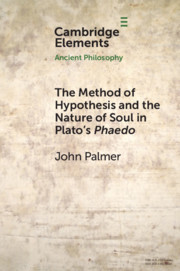Description
The Method of Hypothesis and the Nature of Soul in Plato's Phaedo
Elements in Ancient Philosophy Series
Author: Palmer John
Language: English
Subject for The Method of Hypothesis and the Nature of Soul in...:
Approximative price 22.46 €
In Print (Delivery period: 14 days).
Add to cart
Publication date: 02-2021
Support: Print on demand
Support: Print on demand
Description
/li>Contents
/li>
This study of Plato's Phaedo promotes better understanding of its arguments for the soul's immortality by showing how Plato intended them, not as proofs, but as properly dialectical arguments functioning in accordance with the method of hypothesis. Unlike the argument for the soul's immortality in the Phaedrus, which does seem intended as a proof, the Phaedo arguments are proceeding toward the first principles that could serve as the basis for a proof - the most important being an account of the soul's own essential nature. This study attends to the substantial progress the Phaedo makes toward such an account. It also considers Socrates' epistemic situation in the dialogue and the problem of whether his confidence in the face of death is misplaced if his arguments have not been proofs before considering how the concluding myth draws together several of the dialogue's main themes.
1. Introduction; 2. The inconclusive character of the Phaedo's arguments; 3. The dialectical function of the method of hypothesis; 4. Dialectical progression in the discussion of suicide; 5. The dialectical function of the cyclical arguments; 6. The recollection argument's introduction of the Forms hypothesis; 7. The turn to the nature of soul in the affinity argument; 8. Soul as substance in Socrates' response to Simmias; 9. Toward the nature of soul in the final argument; 10. Justified belief on the way to first principles; 11. Mythologia and the Philosophic Life.
© 2024 LAVOISIER S.A.S.
These books may interest you

The Platonic Art of Philosophy 121.51 €

The Platonic Art of Philosophy 32.87 €


